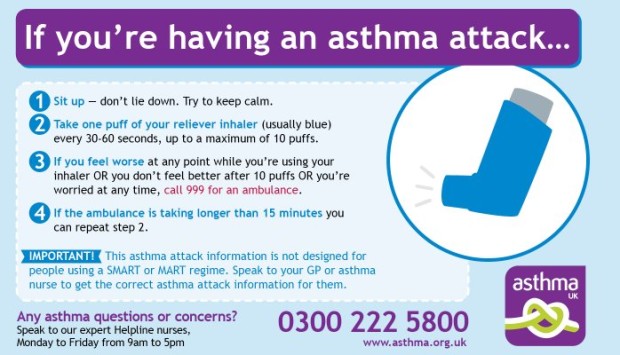Asthma – more dangerous than you think
Did you know that Asthma affects nearly 10% of children? Fortunately for most of us who have suffered or have friends or family with the condition we’re lucky that it’s normally a mild form. Unfortunately this is not always the case. According to Asthma UK , someone has a potentially life-threatening ashtma attack every 10 seconds and 3 people die each day. Sadly Asthma UK also reports that two-thirds of these deaths could be prevented.

In this blog I want to explore the condition of Asthma further and outline the role of first aid in treating life-threatening asthma attacks.
What is Asthma?
Asthma is a chronic respiratory condition which causes difficulty in breathing. It is marked by spasm attacks in the bronchi of lungs and is connected to allergic reactions and other forms of hypersensitivity. The spasm attacks cause tightness in the chest, the airways to and from the lungs become inflamed, and this produces phlegm which makes it difficult to breath.
What causes Asthma?
You are more likely to develop asthma if:
- You or your family have a history of suffering from asthma, eczema or allergies
- You had bronchiolitis as a child
- You were born prematurely or had a low birth weight
- Your mother smoked while she was pregnant with you, or you grew up around people who smoked in your presence
- You have been exposed to certain substances at work such as chemicals or dust
- You’re an adult female
What triggers Asthma?
As highlighted above Asthma is connected to allergic reactions and other forms of hypersensitivity. Time of year is influential, although as with all triggers, it’s not the same for everyone, some sufferers find winter and it’s colder air difficult. Whereas for others it’s spring and the inevitable rise of pollen in the air. Triggers can have more of an effect when combined with other triggers, again this will vary for different sufferers.
Here are some common triggers:
- Alcohol
- Emotions
- Female hormones
- Moulds and fungi
- Recreational drugs
- Stress and anxiety
- Animals and pets
- Exercise
- House dust mites
- Pollen
- Sex
- Weather
- Colds and flu
- Food
- Indoor environments
- Pollution
- Smoke
How to treat Asthma?
Fortunately there is a lot more support for Asthma sufferers than there used to be. The general approach to treatment, unless it’s for severe asthma, is self-management. Research has shown having a written asthma action plan reduces the risk of having a serious asthma attack by four times. A written plan will document what asthma medicines you need to take, what your triggers are, what symptoms require you to administer your inhaler, what symptoms require you to contact your GP, and lastly what you need to do if you have an asthma attack. Other recommendations include regular asthma reviews with a GP or asthma nurse and taking care of the sufferer’s emotional well-being.
How to help Asthma sufferers in the workplace
The following symptoms might indicate someone might be suffering from an asthma attack:
- Coughing
- Short of breath
- Wheezing
- Unusually quiet
- Sufferer is feeling tightness in their chest
This image illustrates advice from Asthma UK on what a sufferer should to do. Any first aiders should aim to provide the necessary support to help a sufferer follow these steps.

What to do if you are having an asthma attack
I hope you found this summary useful. Most of the research on this page comes from Asthma UK. If you would like to read more please visit their excellent site!




